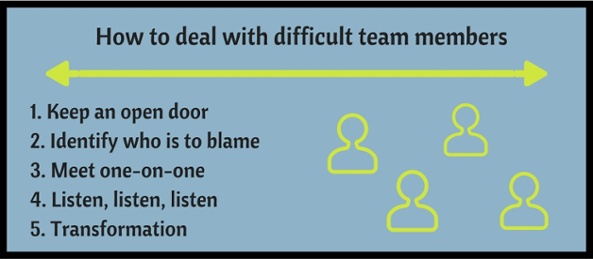Everyone has worked with a jerk colleague before. Everyone.
If you say you never have, then lucky for you, but take our word for it that it frigging sucks. There‘s little worse than working with a teammate who is, well, a jerk to everyone. However, being a jerk isn‘t the only way that it can be difficult to work with somebody. Many people are plainly nice and well-intentioned, but for whatever reason, they do not function well in a team, which is a drag for everyone else.
Honestly, dealing with a jerk is pretty easy: tell them to get their act together, or else they‘re going to be fired. Simple. You shouldn‘t be hiring jerks in the first place, because even if they are highly skilled and talented, jerks destroy company success overall.
Dealing with a difficult team member who is not a jerk, on the other hand, can be brutally challenging for a lot of managers. Especially if the manager is fresh to the gig and is wrangling a team for their first time, a difficult employee can reduce a team‘s productivity by 30-40% if their behavior isn‘t rehabilitated.
Employees of the non-jerk variety can be difficult team members for a number of reasons. Maybe they had a personal falling out with a teammate over a dispute outside of work. Maybe they have never even worked on a team before, and plainly don‘t know how to play along. Maybe the difficult team members are in the wrong position and are acting out because they are frustrated.
Whatever the case may be, if a manager takes the following advice in this post, they can reform the troublesome teammate into a brilliant team player.

Keep an open door
In a supervisory position, it is your duty to steer the ship and maintain morale. However, before we even get into the how of transforming your team members from troublesome to beneficial, there is something to consider:
Your team will not even let you know a problem exists before it becomes unmanageable if they don‘t feel they can/should approach you.
Make sure that you have established that you are not just keen to keep your employees happy, but that when problems do arise (and they will) you aren‘t just talking the talk. Lip service is managerial suicide, while results inspire and motivate your team.
Identify who is to blame
Someone has come to you and complained about a difficult teammate. This is where you identify jerk or no jerk. Hopefully, it‘s the latter.
Take a step back and before leaping into action, figure out why this person is supposedly trouble for your team. Are they missing deadlines? Are they making others uncomfortable with inappropriate remarks? Do they smell bad?
Also, taking the whole picture into account will help you identify whether the person being complained about is the problem, or if it is the one complaining to you. If the whole team agrees it‘s that one guy messing things up, then, of course, it‘s that guy. If nobody else agrees with the complaint, then it‘s the plaintiff to blame for the problem, and you can take the steps to solve it.
Whatever the cause is, you can only start to solve it once you know it.
Meet one-on-one
After identification, meet face-to-face with the difficult person. Whether it is the simple issue of tardiness, or if it‘s a graver offense such as insubordination, meeting with the offender in person is the swiftest way to solve the dilemma. The value of one-on-one meetings with employees cannot be underlined enough for effective assessment and problem-solving.
Listen, listen, listen
This is your greatest tool for obliterating a difficult teammate and creating a brilliant team player: listening to them. Harvard Business Review has an excellent article on the value of listening, which often comes hard for managers.
For example, say you are dealing with a worker whose tardiness has become a problem for the team. Telling them not to be late anymore is not going to help anyone. Clearly there is something making them consistently late, but what is it? Unless you know what, the problem will persist, or perhaps manifest itself in other problematic behaviors.
To continue the example, after you inform the party that tardiness is making it difficult for their team, ask if there is something going on at home, and listen to their response. What they say next to you, whether “yes” or “no” will speak volumes.
If they answer “yes,” listen to what it is. Maybe it‘s a minor, temporary set back and they are working on sorting it out. If so, great. Hopefully, it can be solved with your assistance and build morale.
If it is something unsolvable and long-term, such as taking the kids to school, then perhaps you will swap them off the team and replace them with another employee who can work the hours. Maybe they are better off in a more flexible department, but you will only be able to get that far if you have listened to them.
If they answer “no” then the answer lies in the workplace for why they don‘t care to show up on time. People are not always comfortable with being forthcoming when unhappy, so if something at work is bothering them and resulting in bad teamwork, suggest some examples for why they are unhappy.
Maybe they aren‘t challenged enough (70% of Americans are not) to care for the job, or they feel undervalued in terms of compensation or recognition. Maybe the job is just too darn difficult for difficult team members to do, and they‘ve just been too shy to ask for help. After you hear them disclose the root of the issue impacting their work you can take the steps to solve it, and turn them into a golden team member. The only way to craft a solution is to first listen to the problem.
Transformation
The previously mentioned example of tardiness is but one out of dozens of possible ways a team member can be difficult for others to deal with. However, if someone is not playing nice with others, whatever the behavior, it is because they are unhappy or unsatisfied in some way, or have been completely ignorant that their behavior is disruptive.
As long as they aren‘t a jerk to begin with, once you solve what is irking them, and thus their teammates, they will be able to act as wonderful team players.



